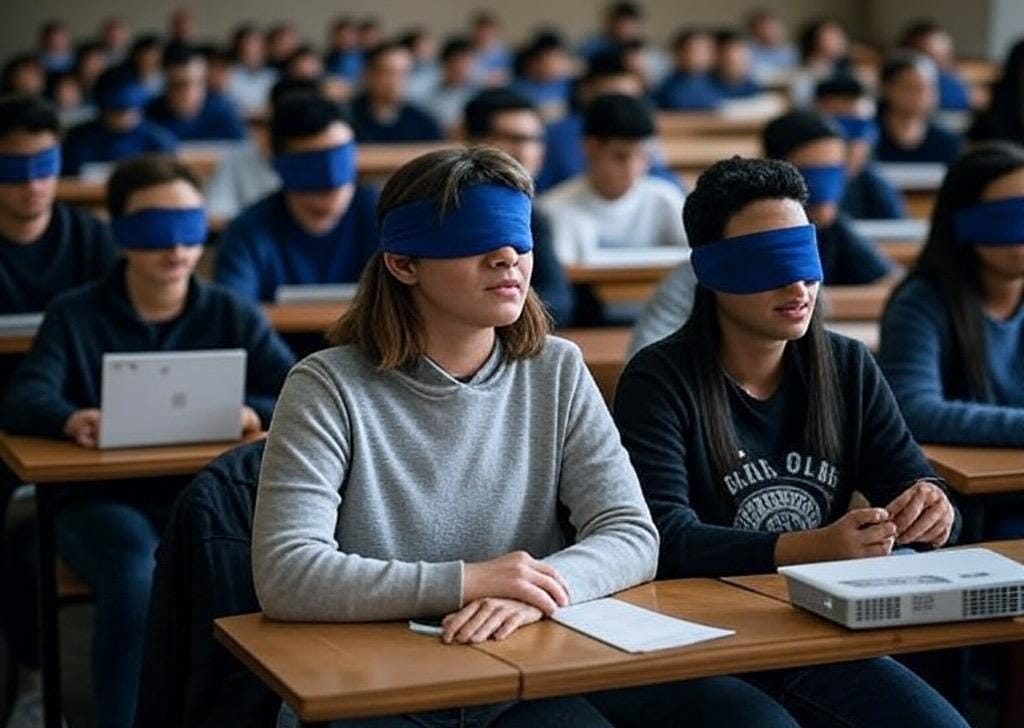In November of 2022, when applying for a university teaching job, one of the preparatory tasks was to mark an example essay. When discussing the task, the interviewer remarked that an increasing trend amongst students is to decide what they think first, and set out to prove it second. I had been teaching at university level for three years by that point, but this statement knocked me back: in a crude form of Bader-Meinhoff syndrome, it forced me to look back on the last few years and reflect on the students I had taught, and realise I had seen this everywhere.
There are a number of problems with this approach to study, obviously; the pursuit of an agenda over actual academic enquiry foremost among them. But the main problem is quite simple: students don’t know what they think. I promise I am not being derogatory; this is, after all, the entire reason university does (or should) exist, and the expectation of a university degree is the student (the uninformed) signs up to learn from educators (the informed).
Yet the sad truth is, students increasingly are arriving at university convinced of their opinions and attitudes to the world, and seeking validation in the form of grades and reassuring feedback; university become affirmational, and not educational. I had spent time, as a student and teacher, in both the history and politics departments of my home university, and the noticeable difference is that the teaching of political history is undeniably conspiratorial.
It seems that behind every questionable or complicated event in human history, lurks a bogeyman, upon whom all blame can be fixed. This bogeyman might change, depending on the lens through which he is viewed: if the lens is economic, then he is The Wealthy; if the lens is racial, then he is White; if the lens is ‘gendered’, then he is a Man; and so on, until we arrive at the intersectional revelation that it is the Wealthy White Man who is to blame.
University has become affirmational, and not educational.
It has been a trend for a long time, whether it was Rousseau’s Discourse on the Origins of Inequality, Marx’s Kapital, or even Hegel’s Lectures on the History of Philosophy, that political historians attempt to explain the movement of history with a grand narrative which, built on a single principle, can explain in any instance why a decision was made or a course of action taken.
To put it simply, students of politics are convinced that history has been one continuous movement in a single direction, not always one of improvement, and, with a single grand narrative to explain that movement, any “bad” events are consequences of the “bad guys”. One particular period in history that students seem to fall foul of this error is, almost inevitably, the colonial and imperial eras.
I read one essay that told me in a very confident manner the caste system in India, a hierarchical structure that has existed in a relatively fixed form for nearly 3,000 years, was a product of imperialism and white supremacy. Never mind that the British arrived in India, historically speaking, extremely recently; the philosophy of a small clique of European intellectuals (which was by no means uncontested) was to blame for the extraordinarily rigid social system of an entire subcontinent.
When I taught a class the racial politics of the American Civil War, they sat in stunned silence at the revelation that Native Americans owned slaves and many fought with the Confederacy. One particularly egregious example came out of a discussion on why the Scramble for Africa took place. Students, in a certainly expected way, assuredly told me it was to do with white supremacy and a European supremacy that saw Africans as less than human. When I told them David Livingstone, a prominent anti-slavery campaigner, was invoked at the Berlin Conference in 1884 to justify African conquest on the grounds of “stamping out slavery”, it simply couldn’t be reconciled.
The ultimate feeling of futility comes when students then take these facts and, almost unable to deal with the cognitive dissonance, revert back to the only possible answer: this must have been White Supremacy, somehow. And the perfidious supremacy can’t be identified, obviously, because even the way we think is conditioned by it. So goes the logic I always hear.
Consistently, I find examples come when discussing the law, on a multitude of modules. Students seem overwhelmingly convinced that law is made by a clique of elites in their interest, and exists only ever to protect “privilege”. The concept of a common law has almost disappeared from the youth consciousness, and when asked why something is illegal, I am met with answers that “they decided it should be.” Who are they? The students are never sure, or why, or even how this could have come to be, and end up retreating to the aforementioned groups. Asking, in a criminological module, where the idea of a crime comes from, yielded answers unsure of who originated the law but it was inevitably about control. Why is theft illegal? Because rich people want to control poor people, I was told.
Even when students might be right in their points, they do not know why. It’s as if students were taught the wrong way around.
Discussions of rights typically exhibit the problem clearest. An overriding attitude amongst students is not just that some groups were denied equal access to rights in history but that they still are. Worse still, this has always been the case across the world, yet is still the fault of some elites somewhere. When pressed to identify examples, students almost invariably fail, but they are convinced nonetheless. Explaining to a recent class, convinced of the irrelevance of the US constitution, that the Supreme Court upheld the right to same-sex marriages on the basis of the 14th amendment from 1868, I was told Americans from then would not approve of using the law that way. Perhaps, I countered, but does that not show the flexibility and therefore relevance of the constitution? No, because the constitution was written by and for a specific set of people.
Of course, there are certainly examples in history that can be presented of equal access to rights being denied to people, on different criteria, but students seem ignorant of these. As a result, even when students might be right in their points, they do not know why. It’s as if students were taught the wrong way around.
The problem with all of this is not only that students’ conspiratorial approach to the study of history flattens out the messy and complicated reality of events; it makes teaching history very difficult. The real-world consequences are creeping in: the Black Boy Lane phenomenon is a poignant example, but it is not isolated. The ultimate consequence will be the imposition of this conspiratorial view on real-world politics, and be the final standard by which history and the present is judged.




